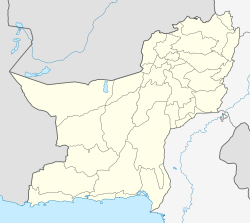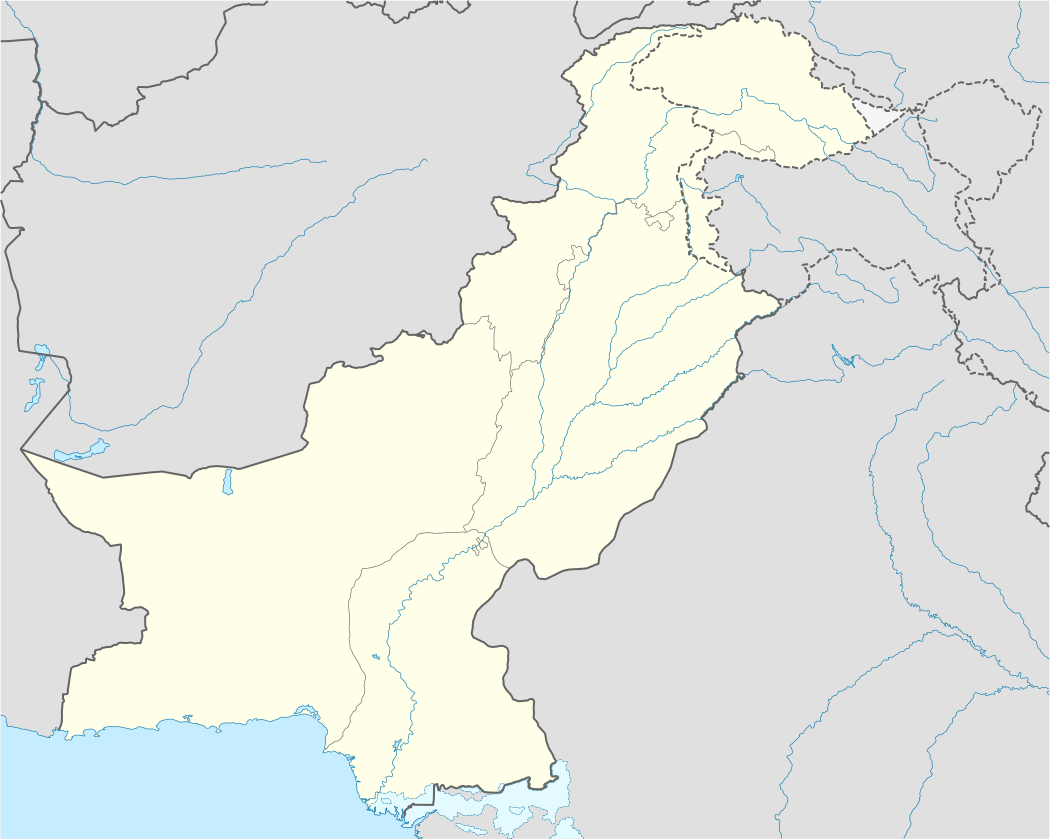Pishin, Pakistan
Pshin or Pxin (Pashto: پښين) is a city that is the capital of[1] the Pishin District of Balochistan province, Pakistan. Pshin connects Quetta, the provincial capital, to Afghanistan. It is considered part of the Pashtun belt of Balochistan, and it is the largest district of Pashtun tribes in the region. Due to its high population and vast area, a new tehsil, Pshin, has been established, and Malikyar is popular place/village for its greenery and production of different kinds of fruits and vegetables. and beautiful lake Band Khushdil Khan is present in Malikyar.
Pshin | |
|---|---|
Town | |
 Pshin  Pshin | |
| Coordinates: 30°35′05″N 66°59′41″E | |
| Country | Pakistan |
| Elevation | 1,555 m (5,102 ft) |
| Highest elevation | 1,700 m (5,500 ft) |
| Lowest elevation | 1,400 m (4,500 ft) |
| Population (1998) | |
| • Estimate (1998) | 20,479 |
| Time zone | UTC+5 (PST) |
History
Pshin was founded by the British Empire in 1883.[2] It played a role in the Anglo-Afghan Wars. Local tribes from the area assisted Baran Khan Tareen in fighting the British by attacking British military convoys en route to Afghanistan. During World War II, the British built two air bases in the district; one near the town of Pshin and the other in Saranan.
Administration
The district of Pshin is administratively subdivided into four tehsils:[1] and one sub Tehsil[3]
Geography
Pshin is located in the northwest of Balochistan,[4] in the east of the province near the border with Afghanistan. Tremors from the 2008 Ziarat earthquake were felt in the town. Rain Demolishing Houses in killi khudaidadzai [ Pshin]]
Climate
In the summer, temperatures can reach 40 °C (104 °F). In the winter, temperatures can decrease to below freezing.
Agriculture
The region is known in Balochistan for fruit production. It supplies a variety of fruits such as apples, from areas such as Barshore,Toba Kakari, Malikyar and Khanozai khushab, grapes from Malikyar, Khanozai Khushab Khanzai, Tora Shah, and Ibrahimzai, pomegranates from Yasinzai, Huramzai and Gangalzai and melons, watermelons and tobacco, mostly from Khudaidadzai.
Demographics
Pshin's main ethnic groups are Pashtuns who belong to the Tareen, Syed, Kakar, and Achakzai tribes. Other tribes include Durrani, Sanzerkhail Barakzai, Khiral, and Ghilzai. In the city the majority of the population belongs to Tareen tribe, followed by Syed and then Kakar. Several Christian families also live there.
Tribes
Pshin District is home to several tribes but following main tribes form the major population of the district:[3]
Transport
Transport is mostly by car or bus. The town connects with Quetta, Khanozai, Barshore, and Saranan. In 1883, a major railway and road were constructed to connect towns in Pakistan and Afghanistan.
Notables
- Sardar Mustafa Khan Tareen
- Qazi Muhammad Essa, senior leader of the Pakistan Movement and a close associate of Quaid-e-Azam
- Kader Khan, Indian actor[5][6]
- Jennifer Musa, politician and lady social worker
- Jehangir Ashraf Qazi, diplomat, former Pakistani ambassador to the United States
- Qazi Faez Isa, Justice of the Supreme Court of Pakistan
- Sultan Golden, motorcycle Stuntman
- Syed Haji Malak Barat, tribal elder of Ibrahimzai
- haji israel kako,tribal elder of kamalzai
- Hakeem Tareen Current Leader of PMAP khudaidadzai
See also
- Ibrahimzai
- Bala Ibrahimzai
- Khanozai Khushab
- Zar Manzaki
- Khudaidadzai
- Shamozai in khudaidadzai
References
- Tehsils & Unions in the District of Pishin – Government of Pakistan Archived 26 March 2012 at the Wayback Machine
- "Pshin". Encyclopædia Britannica. Encyclopædia Britannica Online. Encyclopædia Britannica Inc., 2015. Web. 02 Apr. 2015.
- http://visitorsheaven.com/Pshin.php
- "Location of Pshin – Falling Rain Genomics". Retrieved 9 November 2014.
- "Biography of Kader Khan". OneIndia. Retrieved 20 July 2011.
- "Biography of Kader Khan". Filmy Friday. 14 April 2009. Retrieved 20 July 2011.